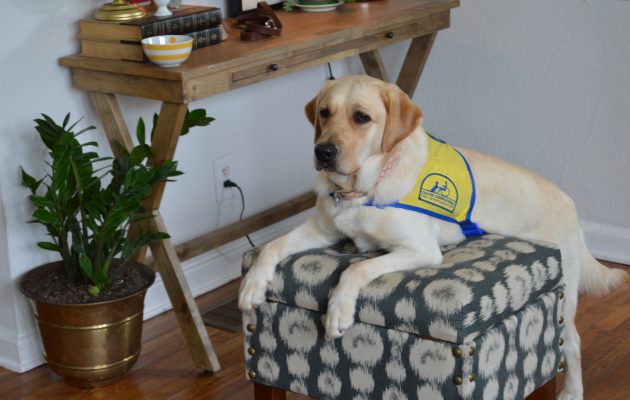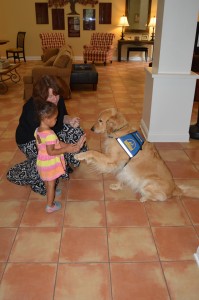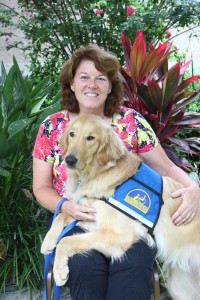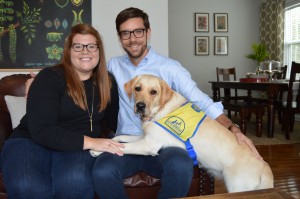Raising puppies that change lives
Posted on September 3, 2015 By Editor Articles, Neighborhood News, Top Stories

Imagine adopting an eight-week-old puppy, training it to obey your every command and then, after a year and a half, happily giving it away without looking back.
That’s what Kelly and Barrett Gates plan to do.
The San Marco husband and wife team are first-time puppy-raisers for Canine Companions for Independence, a nonprofit organization that provides highly trained dogs for people with disabilities.

Two-year-old Domenica Pitt-Tarabori of Fort Walton Beach high fives the facility dog Reed in the foyer of the Ronald McDonald House.
Canine Companions trains four types of assistance dogs: service dogs, which assist adults with physical disabilities by performing daily tasks; hearing dogs, which alert the hearing impaired to important sounds; skilled companion dogs, which assist children and adults with physical, cognitive and developmental disabilities; and facility dogs, which work with a professional in a visitation, education or healthcare setting.
In June 2014 CCI provided the Gates with an eight-week old Golden-Lab mix named India IV, which they agreed to train in the basics. For 18 months, the couple has been tethered to India 24/7. They have taught her to sit, shake, heel, lie down, high-five, stay and standby quietly for as long as two hours at a stretch.
India has accompanied them to movie theaters, restaurants, parks, grocery stores, and to the University of North Florida, where Kelly works as Assistant Director of Special Events. The pup can go anywhere except dog parks, zoos and concerts, which CCI says can adversely affect her training, Kelly said.
“We’ve brought her to all kinds of random odd-ball places,” she said. “By the time she’s done there should be no new experience left.”
The Gates became interested in becoming puppy raisers when Kelly was asked by her boss to set up a Paws-for-Stress event involving CCI puppies during finals week at UNF. Kelly invited her husband, who was partial to cats, to come watch the students cuddle the pups when a large group of raisers brought them to the UNF Library as a way to relieve pressure on campus during intense studying.
“I talked the ears off every puppy raiser there,” said Kelly. But it was Barrett who surprised her by suggesting they look into become puppy raisers themselves.
“This is my first dog. I was not a dog person before,” Barrett said. Fortunately, India adores Barrett’s 10-year-old cat, Nibroc. “If you ask India, they’re best friends. If you ask the cat, it’s ‘no comment,’” Kelly said.
“When I told people what we were going to do, they would ask me where Barrett was going to live,” Kelly laughed. “Now he is 100 percent a dog person.”
The Gates applied to become puppy raisers, attended meetings with the local CCI puppy-raising community and began to study dog-training manuals. Soon they got the call from CCI that their pup would be on a plane from California.
Born to CCI breeders in Santa Rosa, California, India’s training began when her breeders exposed the newborn to loud tape-recorded noises such as fireworks, train whistles, sirens and airplane engines.
“They get sound exposure from the beginning, so that if they become a guide dog they can’t be thrown off,” Kelly explained, noting that India was not phased by the crackling pops of San Marco’s 4th of July celebration.
Once India arrived, the Gates immediately began working to make sure she would not urinate in the house. They set an alarm to ring in 10-minute intervals to remind them to take her outside. Catching on quickly, she was more or less trained during their first weekend, Kelly said.
When she is “working,” India wears her uniform, a special CCI training vest. When she has “free time” they take it off, which signals her that it is okay “to be a dog,” and play with neighbor puppies or go for a walk. “They truly understand the difference,” said Kelly. “When the vest is on it means, ‘I’m working.’ When it’s off, she knows she can be a puppy,” Kelly said. “That is, with acceptable puppy behavior,” Barrett added.
On November 15, India will graduate from basic training in a ceremony in Orlando. Afterwards she will matriculate to a six-month advanced program where she will continue to be educated by professional dog trainers.
“The turn-in date will be the hardest day,” said Kelly, adding she hopes she will make it back to her car before crying. “We love her wholly and entirely, but we know someone needs her more than us. We know she’s going to change someone’s life.”
Only 42 percent of CCI dogs pass advance training to become service animals, said Kelly. “If she passes or fails it’s a win-win,” she said, noting she and Barrett have first right of refusal to adopt her for their own. “If she passes, she wins; if she is released, she can come back home here.”
Dog’s boundless love heals wounds
CCI supplied Ronald McDonald House with Reed, a facility dog that successfully graduated from advanced training in Orlando. Like India, Reed is a Golden/Lab mix from Santa Rosa, California, which had been farmed out to a puppy raiser in North Florida.
While some organizations require clients to pay as much as $30,000 for a service or therapy dog, CCI does not charge for its assistance dogs nor expect candidates to pay any of the substantial costs involved with their breeding or training.
As a graduate dog that knows over 40 commands, Reed was pegged by his professional trainers to become a facility dog in 2011 and was eventually paired with Shelli Martin, Family Operations Manager at Ronald McDonald House, who had applied to be a facilitator. Reed replaced RMH’s facility dog, Anita, who accompanied former executive director Joy Hardaker into retirement.
To become a CCI facilitator, Martin filled out a 26-page application and trained for two weeks in Orlando before being paired with Reed. The dog lives full-time with Martin in San Marco and he will become her pet when he retires.
Like India, Reed, dons a vest when he works. He serves 40 hours a week at Ronald McDonald House as a source of comfort to the critically ill children who stay there while they seek medical treatment in Jacksonville.
“He’s a great source of fun and provides a social bridge for us with kids who are on the defensive after being poked and prodded during their visits to doctor’s offices,” Martin said, noting many families regard Reed as their dog away from home. “He’s a bridge for us to connect with the child and the family.
“He’s so intuitive with the kids,” she continued. “He seems to know how the kids are feeling. He is very good at reading people,” Martin said. “Reed’s job is to make people feel good. On a bad day, he will come, lay his head in your lap and things are better.”
By Marcia Hodgson
Resident Community News




 (1 votes, average: 5.00 out of 5)
(1 votes, average: 5.00 out of 5)






